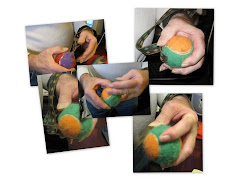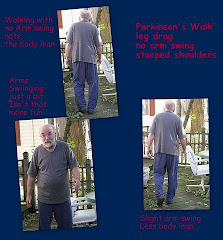Welcome to the second of the Questions about Parkinson's Disease evoloved from a questionnaire submitted by a young student a few days ago.
The Questionnaire
How old were you when you received your PD diagnosis? I have been diagnosed with PD for 6 years. I am now 67. I was aware of symptoms for at least 8 years and my wife was aware of some of my symptoms for several years before that. She did not have a name to go with the symptoms however because she as well as my doctors did not know the early symptoms. By the time a patient is diagnosed the dopamine and norepinephrine levels have already dropped by 60 to 80%. (Serontonin levels and dopamine levels are supposed to be in balance.)
What are the first signs and symptoms of Parkinson's disease? The symptoms can vary from person to person. Stiffness, tremors, balance, walking gait (slow, shuffle) These are also symptoms used in the clinical diagnosis. Loss of sense of smell is an early sign which is not yet widely recognized by internists. It is often one of the earliest signs.
What are the characteristic symptoms of Parkinson's disease? The University of Maryland uses the acronym TRAP: Tremor, Rigidity, Akinesia (lack of movement) Postural instability
Are there other symptoms? Yes, there are secondary symptoms which like the primary symptoms may not occur in every patient.
Stooped posture - a tendency to lean forward
Dystonia - Prolonged muscle contraction causing repetitive movements, twisting
Fatigue
Impaired fine motor dexterity and motor coordination
Impaired large motor coordination
Decreased movement of arms such as decreased arm swing-not to be confused with occurrence of tremors
Akathisia - inablilty to "sit still" often caused by antipsychotics
Speech problems such as softness of voice or slurred speech caused by lack of muscle control Lack of facial expression, or "masking"
Micrographia, small, cramped handwriting
Difficulty swallowing, choking
Sexual dysfunction
Drooling
Constipation
Urinary issues
What are the diagnostic tests used to diagnosis Parkinson's disease? There are really not many diagnostic tests for PD. Rather than testing by an internist or GP, usually the diagnosis falls to a neurologist who specializes in neuro-motor problems.
Conversation and physical observation become the major part of the diagnosis because you can't do a biopsy for PD. CAT or PET scans or an MRIs can rule out other conditions but have little definitive value for PD at the diagnostic stage at this time. Nor is an EEG effective because in all of these tests the brain of a PD patient appears normal. What remains is a clinical diagnosis (office diagnosis) based upon a list of symptoms.
The PD diagnostic symptom check list begins with:
Resting tremor
Bradykinesia (slowness of movement)
Rigidity (increased muscle tone-stiffness-inability of the muscle to flex and relax as it is always flexed)
Postural instability (impaired balance and coordination which results difficulty making normal turns, freezing, compensatory posture)
Diagnoses can be missed or incorrect. But symptom progression becomes the validating measure...or not
Some doctors use the questions on a PDRS which is really a disease tracking method. In my case the internist listened to my list of symptoms and then asked a series of questions: look at my finger etc, cognitive questions, standard neurological questions. He then said that he thought that I either had Essential Tremor or Parkinson's Disease and referred my to a neurologist. I do not know if he checked my chart to see if I was taking any meds which block the production of dopamine in the brain but he may have done that.
You can find that list of dopamine blocking meds here: http://www.wemove.org/par/par_dia.html
When I was diagnosed the neurologist gave me some standard neurological tests and an electro-conductivity test of muscles (Electromyography) which involves needles in the arms, legs, and various places on the body. That test is not to determine Parkinson's but rather ALS - it will also rule out ALS in the case of Parkinson's disease. In my case it confirmed that I had carpal tunnel syndrome. Based upon the clinical tests and his judgement, his clinical diagnosis was PD.
He then prescribed Amantadine because I had already told him about taking CoQ10 and that I would not take Sinemet yet. The Amantadine stopped the pinpoint pains which was a relief.
In the future: At this time there is research underway to develop an MRI test for iron in the brain cells. The technology comes from work with the Diamond Synchrotron.
(You can check the synchrotron in Wikipedia http://en.wikipedia.org/wiki/Synchrotron)
How does Parkinson's disease affect your daily life? The disease begins with subtle differences.
Difficulty getting in and out of cars.
Being stiff and unable to bend to do small household repairs.
Certainly not being able to climb a ladder to make larger repairs because my balance and flexibility are affected. (I used to be a contractor and could literally build a house.) So it has changed me from what I could do to not being able to do simple things.
I can still read and think and spend much of my time learning more about Parkinson's research and therapies as well as writing about them.
Getting dressed is more difficult due to stiffness. I have to be careful about what shirts I wear to exercise therapy because I have to be able to put them on and take them off by myself at the therapy center.
Because I have found supplements which help, I no longer have much problem swallowing and choking. My voice is somewhat restored because of taking DynaCirc CR, a calcium channel blocker which crosses the blood brain barrier and may actually have slowed the progression of the Parkinson's disease.
I was very fortunate to have found a doctor who would allow me to take it - of course I had been a cardiac patient before that and he decided to allow it because of the label use although now it is accepted for off-label usage.
What are some complaints that you have with having Parkinson's disease? A disease which can cost your livelihood it not fun. It makes things more difficult to be on a reduced income in a time when plenty of healthy people are competing with you for the same jobs. Although I still have my cognitive skills, it takes me longer.
Because of the stiffness on one side of my body, I have some difficulty typing. Actually we are doing exercises for that and occasionally I am able to return to typing with both hands. I do not like not being able to make repairs around the house, not be able to do yard work. I used to ride my bike for miles. I have not been able to ride my bike for several years because of the stiffness (and the pain in my knees.)
I never liked taking any pills and now I have to take meds (heart and PD) as well as many supplements which support the treatment. I finally realized, when I added the last supplement, that it was time to make a chart of what to take when.
The problem with having a chronic disease for which there is no cure is that you can read about research and therapies but the process takes a long time. There is a lot of trial and error to find correct directions. Research is very expensive and the FDA makes it very very expensive to get approval.
I feel that after Phase I clinical trials a drug should be offered to the public as long as patients agreed not to sue if there were unexpected side effects. (My wife has mixed feelings about that) But only an act of Congress could get that enacted and there has been a long history of not being able to act in the interests of disease minorities and mixing religion with politics - antithetical to the founding principles of this country but nonetheless present now as it has been throughout history.
You get used to people laughing at the way you move or at least I did - I guess some people just don't go out much because of that.
What changes did you manifest when Parkinson's disease became very bad? I have not reached the "very bad" stage and with some luck and by continuing to use the medication, supplements, exercise, massage therapies I am using, I hope that I will progress very slowly to the next stage...if at all. If I can remain in stage 2 long enough, perhaps I can live long enough to see a cure.
If by very bad you mean when did I see a doctor, I will explain the early symptoms and what took me to the doctor's office for a medical diagnosis.
Understand that by the time I went to the doctor, I was pretty sure that I knew what I had and had already begun to take the antioxidant CoQ10 which actually was helping me. My early symptoms were foot drag - which I had had for a few years but attributed to the arthritis triggered by walking on very hard floors at work; loss of sense of smell which had been steadily going for several years, stiffness which made it difficult to get in and out of cars, some depression which I didn't acknowledge much, a tremor which began in my left thumb, and small pinpoint sized powerful pain in my torso and later anywhere on my body - this made me think that there was something neurologically wrong with me and that is why I made the appointment.
These are some of the problem issues of the early stages of advanced Parkinson's disease:
Cognitive decline
Behavioral problems
Communication
Difficulty with urination
Falls
Impaired performance of activities of daily living
Sexual dysfunction
Swallowing
Walking and balance problems
Weight loss
While these problems may occur at any stage, they can become more pronounced in advanced stages. It is a matter of degree.
If you don't mind me asking, what type of health-medical insurance do you have? Originally the health provider was Kaiser Permanente which I had through work. Finding a set of doctors was fairly easy although not all were versed in Parkinson's and my husband had to do most of the information searching on his own. We are now using Aetna Plus Medicare. Unlike the Kaiser HMO, it does not appear to cover as many alternative therapies while Kaiser was limited but some of that is a grey area since I am new to the plan.
Many of the medical expenses associated with the right kind of treatment for Parkinson's are not covered by our insurance since they involve massage therapy, exercise therapy, swim therapy, expensive supplements. Much of our income goes to PD expenses.














No comments:
Post a Comment
Welcome to Parkinsons Focus Today.
We are delighted to hear from you by comment here
or through email as found in Contact Us.
Please do not include email addresses if leaving a comment online.
Email addresses are used only for email responses.
Spammers take note: your messages will not be published. The comments section is for an exchange of ideas, not for backlinks.